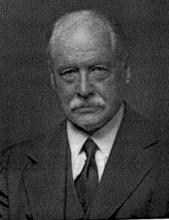William Ernest Hocking, American philosopher, was born in Cleveland, Ohio, on 10 August 1873. Soon after his birth, his father, a homeopathic physician, moved the family to Joliet, Illinois. The Methodism of his upbringing profoundly shaped his faith conviction. Hocking worked as a surveyor, mapmaker, and illustrator before enrolling at Iowa State College of Agriculture and Mechanic Arts in 1894 to train for a career in engineering. His reading of William James’s The Principles of Psychology inspired him to pursue studies at Harvard, where he was taught by James and Josiah Royce, graduating A.M. in 1901. During 1902–1903 Hocking studied in Germany at Göttingen with Edmund Husserl (the first American student to do so), with Wilhelm Dilthey in Berlin, and also at Heidelberg. Harvard awarded him a Ph.D. in 1904.
Hocking served as professor of philosophy at Yale (1908-1913) and Harvard from 1913 until his retirement in 1943. He has been described as ‘second only to John Dewey in the breadth of his thinking’ (see Lachs and Hester, eds., A William Ernest Hocking Reader). After the death of his teacher Josiah Royce, Hocking was appointed to the extremely prestigious Alford Professorship of Natural Religion, Moral Philosophy and Civil Polity (1920-1943). His contribution to philosophical discourse, sometimes described as ‘negative pragmatism’ (‘That which does not work is not true’), also draws upon idealism, empiricism and naturalism. He sought to move beyond modern liberalism by radicalizing the liberty and power of the individual, and argued for the value of Christianity in the construction of world civilization. Hocking served the Layman’s Foreign Missions Inquiry as chairman of their Commission of Appraisal, resulting in the publication in 1932 of Re-thinking Missions: A Laymen’s Inquiry After One Hundred Years. He was appointed Gifford Lecturer in Natural Theology at Glasgow University, lecturing on ‘Fact and Destiny’ in 1938-1939, and delivered the Hibbert Lectures in 1939 on the theme ‘Living Religions and a World Faith’ (published under the same title in 1940).
Although interest in his work diminished quickly after World War II, coinciding with idealism’s general fall from fashion, William Hocking was truly one of the giants of philosophy in the first half of the twentieth century. He served on the front during World War I, and was a member of the Society of Mayflower Descendents and the American Society of Puritan Descendents. He was married to Agnes Boyle O’Reilly, and their son, Richard Hocking, followed in his father’s footsteps as a teacher of philosophy at University of Chicago. After his retirement in 1943, Hocking moved to a farm in New Hampshire, where he continued to write and lecture until his death on 12 June 1966.
Hocking’s key writings include The Meaning of God in Human Experience: A Philosophic Study of Religion (1912), Morale and Its Enemies (1918), Human Nature and Its Remaking (1923), Man and State (1926), Types of Philosophy (1929), Thoughts on Life and Death (1937), The Lasting Elements of Individualism (1937), Science and the Idea of God (1944), The Coming World Civilization (1956) and The Meaning of Immortality in Human Experience (1957). A William Ernest Hocking Reader, with Commentary (2004) was coedited by John Lachs and D. Micah Hester.



